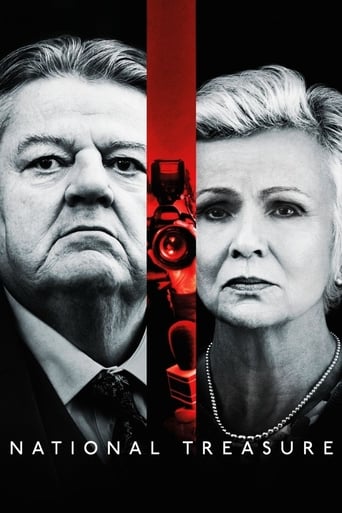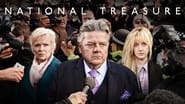contactjasonkohl
National Treasure goes deep into the routes of sexual abuse and rape. Everything from the fighting to a simple tear that was shed had detail. Senses were focused on, the anxiety, the suspense, the craziness can all be felt in this show. The acting was well staged, it felt real and you could feel the pain of each actor. It's also before it's time. This was before the #MeToo movement but it gave insight to what life is like when elite men are accused of sexual misbehavior.
watcher410
This was a great series. Here is a question: Why didn't Karl come clean in his testimony? It seems like Paul's wife wanted him to testify in way that would confirm the raped woman's version. Did Karl decide that he didn't like her after having spent all those years wishing she could be his?
bob the moo
I had heard lots of positive reviews of this drama, and of course the timeliness of the narrative is obvious to all. A celebrity who had been at his peak in the 1970's is accused of sexual assault by multiple victims, leading to press and prosecution. The plot seems fairly straightforward in terms of what it does, and for sure the "ripped from the tabloids" content made me think it would be soapy, dramatic, and perhaps be hammed up for the sake of being cathartic. Instead the drama tends to avoid this totally and goes for a tone/content which I liked, even if I think it didn't totally work all the time.This tone is one of creepy observation of the whole thing. In some ways it works because it seems to avoid cliché and expectation, leaving the viewer to go with it in a way perhaps they would not have done had it been so obviously one way or the other. It had its limits for me, simply because it was so very reminiscent of the Channel 4 show Utopia. This is for good reason since they share director, DOP, and composer at least; but the use of this package worked so well in the sci-fi that it made me feel it unsuited here. Perhaps to those coming to it for the first time there would be no such reservation due to the lack of association. It does work though, and the atmosphere it produces allows the performances to (ironically) feel more natural within a stylized presentation. Coltrane is great, but Walters is by far the standout in her gradual doubt on her way to clarity. Riseborough is also very strong. The younger versions of the cast are also very good, matching the "main" performances very well.Overall it is an effective drama which is well balanced, allowing the viewer room to think. I wasn't totally sold on the style, but for sure it works.
l_rawjalaurence
Newspaper reviewers have predictably commented on the parallels between Jack Thorne's drama and the so-called "Operation Yewtree," in which major celebrities - the "national treasures" suggested by the title - were found to be serial abusers, or used their fame to exploit the vulnerable. The two central performances of Robbie Coltrane as Paul Finchley and Julie Walters as his wife have also received due recognition.Yet Marc Munden's drama contains so many other brilliant aspects, that don't necessarily focus on the more salacious material but try to explore how and why Fınchley should behave as he did. What we understand from the celebrity and his wife is how narcissistic they are; despite their frequent protestations of love for one another, as well as for their daughter Dee (Andrea Riseborough), they are pathologically incapable of listening. Riseborough's characterization is profound; she does not speak much, but she has a way of looking at the ground, almost as if she cannot face the ordeal of communication, especially with her parents. There is one sequence in particular involving Marie and Dee that sums up the emotional disconnect between them; taking place in a bedroom during Dee's birthday party, Marie emphasizes quite vehemently that she wants her daughter to get better, without understanding in the least how she and her husband are the root cause of Dee's problems.Munden's production is distinguished by memorable cinematography from Ole Bratt Birkeland. Birkeland is fond of long tracking shots, with the camera moving down lengthy corridors to discover the characters. As viewers, we feel we are eavesdropping on their private secrets - just like Peter and Marie, as they seek to find out what's "wrong" with Dee. Birkeland also uses lighting to reinforce the theme: during the birthday party Peter gives one of his windy speeches. As he does so, the camera tracks slowly to the left, revealing candles at the front of the frame, and after a few seconds settles on Dee, looking once again at the ground in embarrassment, her face obscured by yet more candled. Material things seem to matter more to Finchley - they can be easily controlled, and do not require him to empathize. The fact that Dee appears at the end of the shot emphasizes her insignificance.Much of the action unfolds in a dream-like world of psychedelic greens, reds, and blues, drawing attention once more to the fantasy-world that Peter and Marie inhabit. Alternatively several sequences take place in darkened rooms, illumined by miserable spotlights; the perfect ambiance for anyone to behave inappropriately without fear of discovery.Despite its pertinent subject-matter, NATIONAL TREASURE is not really about the abusive celebrity, but looks instead at the destructive ways in which parents - especially those who profess a blameless way of life - destroy their siblings, as well as others, through neglect, or by assuming that people will behave in certain preordained ways. The action unfolds slowly in a series of lengthy exchanges punctuated by occasional musical interludes (by Christobal Tapis de Veer, but remains compelling. This is one of the best dramas I have seen on any medium in the entire year.





